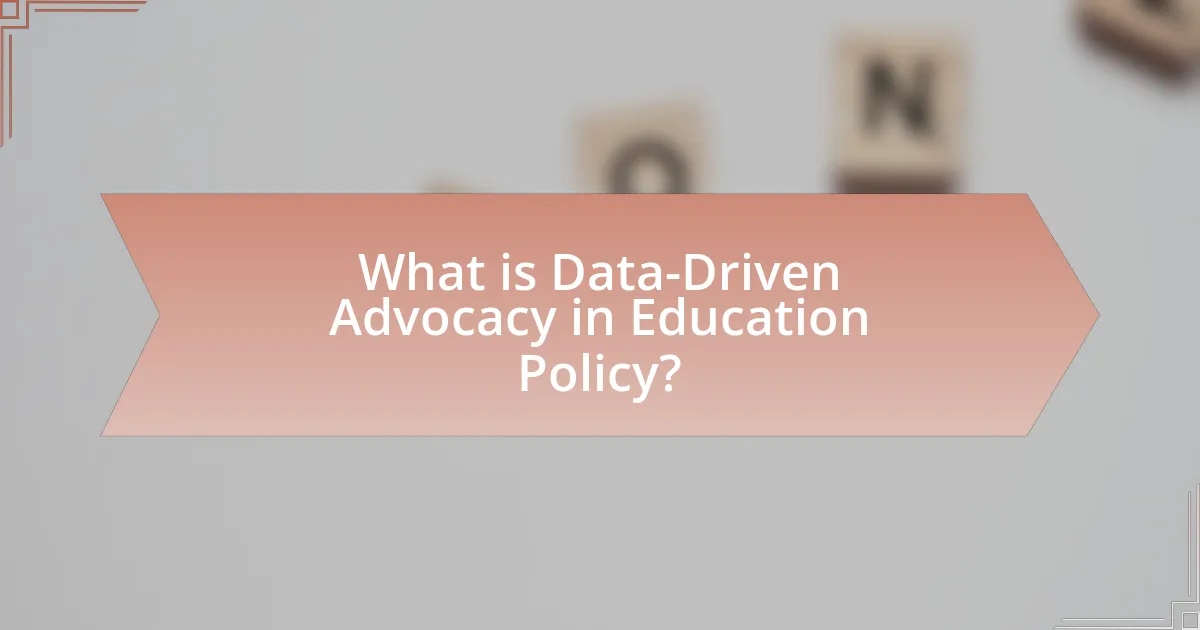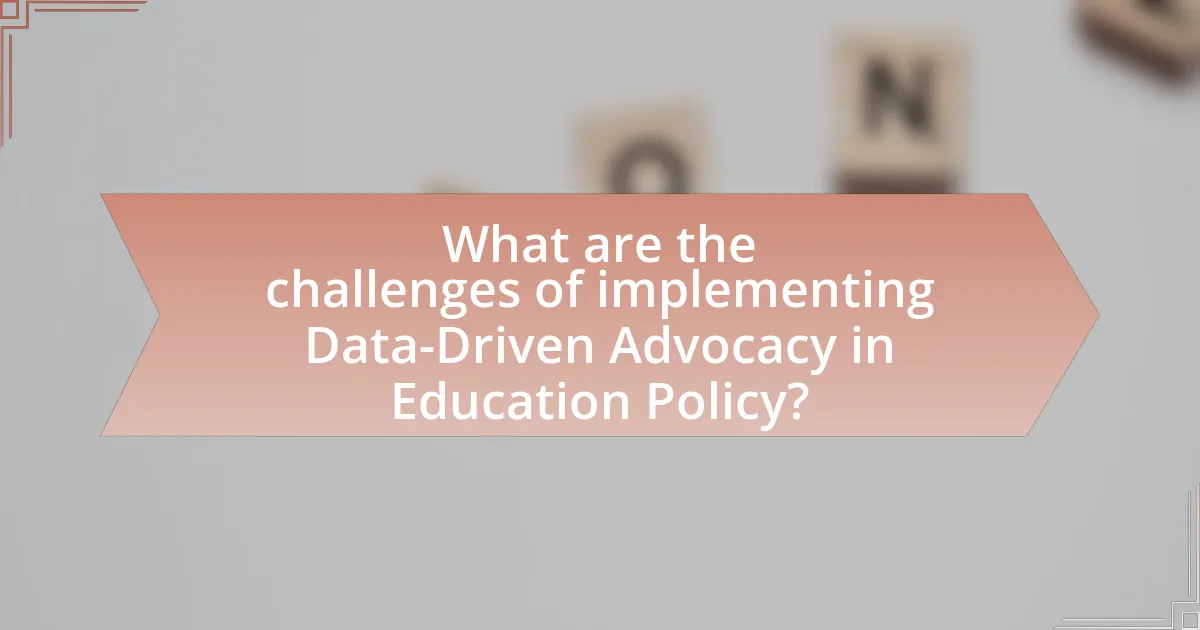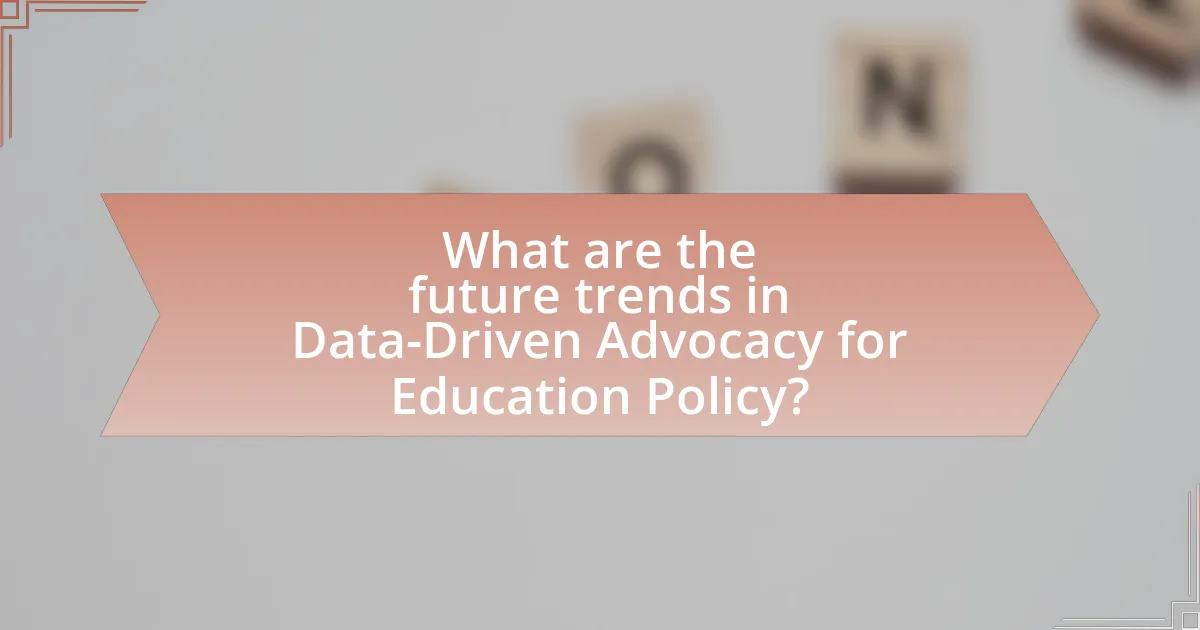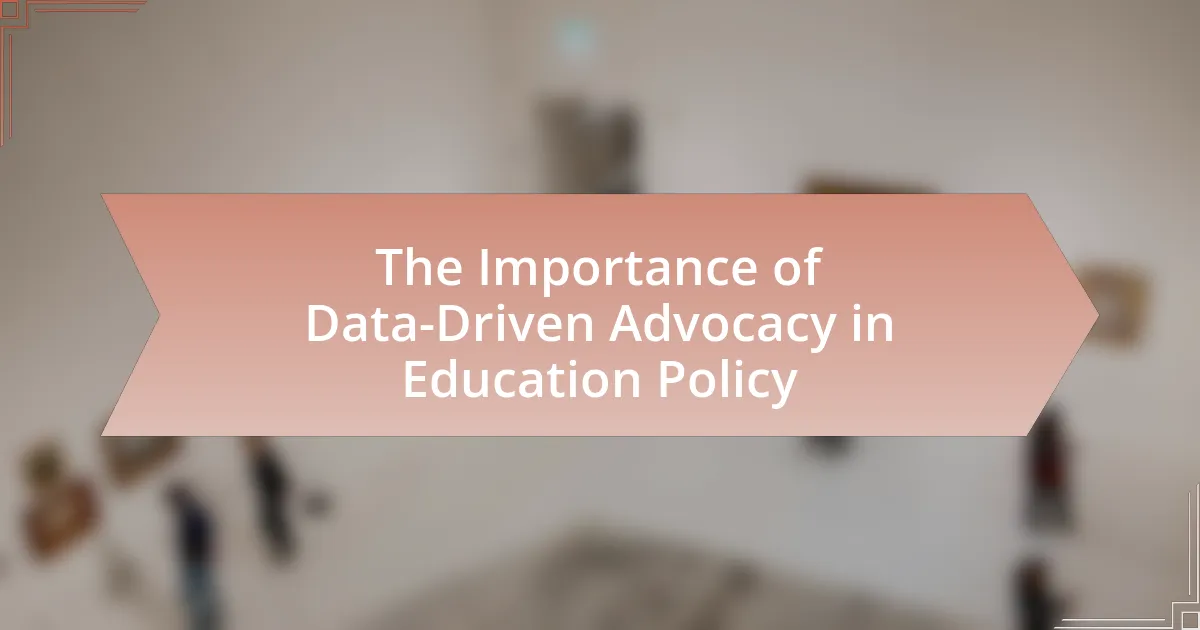Data-Driven Advocacy in Education Policy is a strategic approach that utilizes empirical evidence to influence educational policies and practices. This article explores how data-driven advocacy impacts policy decisions by providing quantifiable evidence, the types of data commonly used, and the methods of data collection and analysis. It highlights the essential role of data in enhancing stakeholder engagement, the challenges faced in implementing data-driven strategies, and the ethical considerations involved. Additionally, the article discusses future trends in advocacy, the influence of technology, and the skills necessary for effective data-driven advocacy, offering practical steps for advocates to enhance their efforts in shaping education policy.

What is Data-Driven Advocacy in Education Policy?
Data-Driven Advocacy in Education Policy refers to the strategic use of data to influence and shape educational policies and practices. This approach relies on empirical evidence, such as student performance metrics, demographic statistics, and educational research, to advocate for changes that improve educational outcomes. For instance, organizations like the Data Quality Campaign emphasize the importance of data in driving policy decisions, highlighting that data-informed advocacy can lead to more effective resource allocation and targeted interventions in schools.
How does data-driven advocacy influence education policy decisions?
Data-driven advocacy significantly influences education policy decisions by providing empirical evidence that supports specific reforms and initiatives. This approach enables advocates to present quantifiable data, such as student performance metrics and demographic statistics, which can sway policymakers by illustrating the need for change. For instance, studies have shown that states implementing data-driven strategies, like the use of standardized test scores to inform curriculum adjustments, have seen improvements in student outcomes. This evidence-based approach not only enhances the credibility of advocacy efforts but also aligns with policymakers’ goals for accountability and effectiveness in education systems.
What types of data are most commonly used in education advocacy?
The types of data most commonly used in education advocacy include student achievement data, demographic data, funding and resource allocation data, and qualitative data from surveys and interviews. Student achievement data, such as standardized test scores and graduation rates, provide measurable outcomes that can highlight educational disparities. Demographic data, including information on race, socioeconomic status, and geographic location, helps to contextualize these outcomes and identify specific populations in need of support. Funding and resource allocation data reveal how financial resources are distributed across schools and districts, which can influence educational equity. Qualitative data from surveys and interviews offer insights into the experiences and needs of students, parents, and educators, enriching the understanding of the educational landscape. These data types collectively inform policy decisions and advocacy efforts aimed at improving educational outcomes.
How is data collected and analyzed for advocacy purposes?
Data for advocacy purposes is collected through surveys, interviews, focus groups, and existing datasets, which are then analyzed using statistical methods and qualitative analysis techniques. Surveys and interviews gather firsthand accounts and opinions from stakeholders, while focus groups facilitate in-depth discussions that reveal nuanced perspectives. Existing datasets, such as government reports and academic studies, provide a foundation for comparative analysis. Statistical methods, including regression analysis and descriptive statistics, help identify trends and correlations, while qualitative analysis allows for thematic exploration of qualitative data. This combination of quantitative and qualitative approaches ensures a comprehensive understanding of the issues at hand, supporting evidence-based advocacy efforts in education policy.
Why is data-driven advocacy essential for effective education policy?
Data-driven advocacy is essential for effective education policy because it provides empirical evidence that informs decision-making and policy formulation. By utilizing data, policymakers can identify specific needs, measure outcomes, and evaluate the effectiveness of educational programs. For instance, studies have shown that data-driven approaches can lead to a 20% improvement in student performance when targeted interventions are implemented based on data analysis. This reliance on quantifiable metrics ensures that policies are not based on assumptions but rather on concrete evidence, leading to more successful educational outcomes.
What are the key benefits of using data in advocacy efforts?
The key benefits of using data in advocacy efforts include enhanced credibility, informed decision-making, and targeted messaging. Data-driven advocacy increases credibility by providing empirical evidence that supports claims, making arguments more persuasive. For instance, a study by the Pew Research Center found that 70% of policymakers are more likely to support initiatives backed by solid data. Informed decision-making is facilitated through data analysis, allowing advocates to identify trends and assess the impact of policies effectively. Additionally, targeted messaging is achieved by segmenting data to tailor communications to specific audiences, which can significantly improve engagement and response rates.
How does data-driven advocacy improve stakeholder engagement?
Data-driven advocacy improves stakeholder engagement by providing evidence-based insights that resonate with the interests and concerns of stakeholders. By utilizing data analytics, organizations can identify key trends, measure the impact of policies, and tailor their messaging to address specific stakeholder needs. For instance, a study by the Data Quality Campaign found that 70% of education stakeholders are more likely to engage when presented with clear data demonstrating the effectiveness of proposed initiatives. This targeted approach fosters trust and collaboration, ultimately leading to more effective advocacy efforts in education policy.

What are the challenges of implementing Data-Driven Advocacy in Education Policy?
The challenges of implementing Data-Driven Advocacy in Education Policy include data quality issues, resistance from stakeholders, and the complexity of data interpretation. Data quality issues arise when the data collected is inaccurate or incomplete, leading to misguided policy decisions. Resistance from stakeholders, such as educators and administrators, can occur due to a lack of understanding or trust in data-driven approaches. Additionally, the complexity of interpreting data requires specialized skills that may not be readily available within educational institutions, making it difficult to translate data insights into actionable policy changes. These challenges hinder the effective use of data in shaping educational policies.
What obstacles do advocates face when using data?
Advocates face several obstacles when using data, including data accessibility, data quality, and data interpretation challenges. Data accessibility issues arise when relevant data is not publicly available or is difficult to obtain, limiting advocates’ ability to support their arguments. Data quality concerns involve inaccuracies or outdated information, which can undermine the credibility of the advocacy efforts. Additionally, advocates often struggle with interpreting complex data, making it challenging to communicate findings effectively to stakeholders. These obstacles can hinder the overall impact of data-driven advocacy in education policy.
How can data misinterpretation impact advocacy outcomes?
Data misinterpretation can significantly undermine advocacy outcomes by leading to misguided strategies and ineffective policies. When advocates rely on inaccurately interpreted data, they may promote initiatives that do not address the actual needs of the target population, resulting in wasted resources and missed opportunities for improvement. For instance, a study by the National Education Policy Center found that misrepresented statistics on student performance can lead to the implementation of inappropriate educational reforms, ultimately harming student outcomes rather than enhancing them. Thus, accurate data interpretation is crucial for effective advocacy in education policy, as it directly influences the relevance and success of proposed initiatives.
What are the ethical considerations in data-driven advocacy?
Ethical considerations in data-driven advocacy include the responsible use of data, informed consent, privacy protection, and the potential for bias. Responsible use of data ensures that information is accurate and relevant, which is crucial for effective advocacy in education policy. Informed consent requires that individuals understand how their data will be used, promoting transparency and trust. Privacy protection is essential to safeguard sensitive information, particularly when dealing with student data. Additionally, the potential for bias in data collection and interpretation can lead to misrepresentation of issues, which can adversely affect policy decisions. For instance, a study by the Data & Society Research Institute highlights that biased algorithms can perpetuate inequalities in educational outcomes, underscoring the need for ethical scrutiny in data-driven advocacy.
How can these challenges be overcome?
Data-driven advocacy challenges in education policy can be overcome by implementing robust data collection and analysis frameworks. Establishing clear metrics for success allows stakeholders to measure progress effectively. For instance, the use of standardized assessments and longitudinal studies provides concrete evidence of educational outcomes, enabling policymakers to make informed decisions. Additionally, fostering collaboration among educators, researchers, and policymakers enhances the quality of data interpretation and application. Research by the Institute of Education Sciences highlights that data-informed decision-making leads to improved student performance, demonstrating the effectiveness of these strategies in overcoming advocacy challenges.
What best practices can enhance data accuracy and reliability?
Implementing standardized data collection methods enhances data accuracy and reliability. Standardization ensures consistency in how data is gathered, reducing variability and errors. For instance, using validated survey instruments can lead to more reliable responses, as evidenced by research from the American Educational Research Association, which highlights that standardized assessments yield more accurate data for educational outcomes. Additionally, regular data audits and validation checks can identify discrepancies and improve data integrity, further supporting the reliability of the information used in education policy advocacy.
How can advocates effectively communicate data findings to policymakers?
Advocates can effectively communicate data findings to policymakers by presenting clear, concise, and actionable insights that directly relate to policy implications. Utilizing visual aids such as graphs and charts enhances understanding, while tailoring the message to align with policymakers’ priorities ensures relevance. For instance, a study by the National Education Policy Center found that data visualizations significantly improve comprehension and retention of complex information among decision-makers. Additionally, framing data within real-world contexts, such as local case studies or testimonials, can make the findings more relatable and compelling, thereby increasing the likelihood of influencing policy decisions.

What are the future trends in Data-Driven Advocacy for Education Policy?
Future trends in data-driven advocacy for education policy include increased use of artificial intelligence and machine learning to analyze educational data, enhanced data transparency and accessibility for stakeholders, and a focus on personalized learning outcomes driven by data insights. The integration of AI allows for more sophisticated analysis of student performance and resource allocation, as evidenced by initiatives like the use of predictive analytics in identifying at-risk students. Additionally, organizations are prioritizing open data initiatives, which facilitate collaboration among educators, policymakers, and researchers, thereby fostering informed decision-making. The emphasis on personalized learning is supported by studies showing that tailored educational experiences can significantly improve student engagement and achievement.
How is technology shaping data-driven advocacy in education?
Technology is shaping data-driven advocacy in education by enabling the collection, analysis, and dissemination of educational data more efficiently and effectively. Tools such as data analytics platforms and learning management systems allow educators and advocates to gather insights on student performance, resource allocation, and educational outcomes. For instance, the use of data visualization software helps stakeholders identify trends and disparities in educational access and achievement, facilitating targeted interventions. Additionally, technology enhances communication channels, allowing advocates to share data-driven narratives with policymakers and the public, thereby influencing education policy decisions. According to a report by the Data Quality Campaign, 70% of education advocates believe that data use has improved their ability to influence policy, demonstrating the significant impact of technology on advocacy efforts in education.
What role do big data and analytics play in future advocacy efforts?
Big data and analytics will play a crucial role in future advocacy efforts by enabling organizations to make informed decisions based on comprehensive data insights. These tools allow advocates to analyze trends, measure impact, and identify key stakeholders effectively, thereby enhancing their ability to influence policy changes. For instance, a study by the Data Quality Campaign found that data-driven advocacy can lead to more effective communication strategies, resulting in a 30% increase in stakeholder engagement. This demonstrates that leveraging big data and analytics not only improves the precision of advocacy efforts but also fosters greater accountability and transparency in education policy initiatives.
How can emerging technologies improve data collection and analysis?
Emerging technologies can significantly enhance data collection and analysis by automating processes and enabling real-time insights. For instance, artificial intelligence (AI) and machine learning algorithms can analyze vast datasets quickly, identifying patterns and trends that human analysts might miss. According to a report by McKinsey, organizations that leverage AI for data analysis can improve their decision-making speed by up to 5 times. Additionally, Internet of Things (IoT) devices facilitate the collection of real-time data from various sources, providing a more comprehensive view of educational environments. This integration of technologies not only increases the accuracy of data but also allows for more informed policy decisions in education.
What skills are necessary for effective data-driven advocacy?
Effective data-driven advocacy requires analytical skills, communication skills, and strategic thinking. Analytical skills enable advocates to interpret data accurately, identify trends, and draw meaningful conclusions that support their arguments. Communication skills are essential for conveying complex data insights in a clear and persuasive manner to diverse audiences, including policymakers and stakeholders. Strategic thinking allows advocates to develop targeted approaches that leverage data to influence policy decisions effectively. These skills collectively enhance the ability to advocate for educational policies based on empirical evidence, ultimately leading to more informed decision-making in the education sector.
How can advocates develop data literacy skills?
Advocates can develop data literacy skills by engaging in targeted training programs that focus on data analysis, interpretation, and visualization. These programs often include workshops, online courses, and hands-on projects that teach advocates how to effectively use data to inform their advocacy efforts. For instance, organizations like DataKind and the Data Literacy Project offer resources and training specifically designed to enhance data skills among non-profit professionals. Additionally, advocates can improve their data literacy by collaborating with data experts and participating in community data initiatives, which provide practical experience in working with real datasets.
What training resources are available for education advocates?
Training resources available for education advocates include online courses, workshops, webinars, and comprehensive guides focused on data-driven advocacy. Organizations such as the National Education Association (NEA) and the Education Trust offer specific training programs that equip advocates with skills in data analysis, policy formulation, and effective communication strategies. For instance, the NEA provides a series of webinars that cover topics like leveraging data for advocacy and understanding education policy impacts. Additionally, the Education Trust publishes resources that help advocates interpret educational data and use it to influence policy decisions effectively. These resources are designed to enhance the capacity of education advocates to engage in informed and impactful advocacy efforts.
What practical steps can advocates take to enhance their data-driven efforts?
Advocates can enhance their data-driven efforts by implementing systematic data collection and analysis processes. This involves identifying key metrics relevant to education policy, such as student performance data, demographic information, and resource allocation statistics. By utilizing tools like surveys and data analytics software, advocates can gather and interpret data effectively. For instance, a study by the Data Quality Campaign highlights that organizations using data to inform their strategies saw a 30% increase in successful policy outcomes. Additionally, collaborating with educational institutions and data experts can provide deeper insights and improve the quality of the data collected.


